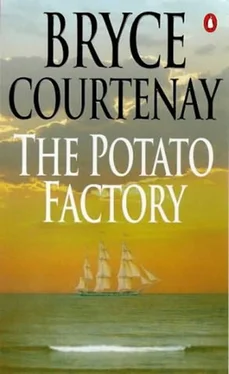With the news that Hannah was to be transported to Van Diemen's Land, Ikey sent a letter by means of a certain Captain Barkman, master of a whaler sailing out of Boston and bound for Sydney, and then directly to Hobart where it would commence upon a whaling expedition in Antarctic waters. In his letter Ikey instructed his eldest son John to take passage with the captain to Hobart Town, and there to negotiate whatever comforts or conditions would be to the benefit of his mother and his brothers and sisters.
John Solomon arrived in Hobart Town not two weeks prior to Hannah's arrival on the Mermaid, and was quickly acquainted with Governor Arthur's desire to place female prisoners with settlers or emancipists in a manner most favourable to the containment of government expenses. Arthur ran the colony like a small-town grocer, aware of the cost of every tin, jar and package on his colonial shelves. Even a single night's detainment in the Female Factory meant a debit in the government books.
Richard Newman, an emancipist and police officer, with a third child on the way, was easily enough convinced by John Solomon that he should apply for Hannah to be assigned as his servant. The formalities were arranged with the authorities, who sought to look no further than sparing the government the responsibility and expense of accommodating and feeding not one, but five additional mouths.
John Solomon arranged for a monthly stipend to be paid a year in advance to Richard Newman, and thereafter to be subject to renewal only if Hannah found the arrangements to her personal satisfaction. In paying the money to the policeman he had demanded a receipt, which had been foolishly supplied without thought for what this might mean at a future time.
It was an unfortunate arrangement from the very first, and the policeman and his long-suffering wife were often to contemplate that all the riches in the world could not make up for the presence of Hannah Solomon and her children under their roof.
Without Hannah in London, Ikey's plans for his Broadway business had to be severely curtailed, and he decided that he had but one card left to play. He must immediately go to Van Diemen's Land and convince Hannah to let him have her half of the combination to the safe. If he could assure her of his constant concern for her welfare while supplying her with every creature comfort, he was confident of an early success. He told himself that his wife would soon come to see the utmost sense in his retrieving their now securely bricked-up fortune so that he might establish a prosperous platform against the time of her release. Perhaps in Canada, the West Coast of America or even the Cape of Good Hope where the English were beginnning to settle in some numbers.
Ikey had made several speculative purchases of land in New York, most of these on the island of Manhattan and in the Bronx. He now set about feverishly turning these back into liquid assets, accepting far less for a quick sale than the true worth of the property.
Ikey managed finally to sell all his interests with the exception of one half-acre corner block in Manhattan which in a moment of weakness he had leased to the Council of American Jews for the Land of Ararat. This was in order that they might build a hostel and reception centre for Jews fleeing from persecution in Europe and the Orient. The buildings were to be of impressive proportions and would be known as the Mordecai Manuel Noah, Ararat Foundation.
Mordecai Noah was a prominent American Jew who had been the consul to Tunis. During his travels he had discovered the plight of the homeless Jews in the Orient and Europe. He dreamed of seeing Palestine returned as a homeland for the Jews, but as a diplomat he was conscious of the impossibility of achieving this mission among the Arab rulers. His thoughts then turned to the great open spaces of America and upon his return from Algiers in 1825 he purchased a tract of seventeen thousand acres on Grand Island on the Niagara River near the city of Buffalo. This he nominated as the site for the temporary Land of Israel and declared himself Governor and Judge of Israel, issuing a manifesto to Jews all over the world to come and settle in the new land which would guarantee them freedom under the protection of the constitution and laws of the United States of America.
Whether the Jews of New York saw this new and temporary Israel as a holy mission worthy of their support, or simply regarded it as an effective way to keep the immigration of undesirable European and Oriental Jews out of their city is not known, but they determined to build an impressive reception centre for the 'New Israelites' so that they could be expedited as speedily as possible to the Land of Ararat. It was the real estate for this centre which Ikey had agreed to lease to the council for a period of fifty years.
This was the most generous gesture Ikey had made in his entire life but it gained him no favour in the eyes of his American co-religionists. They felt that it showed his true criminal rapacity, for they maintained that a good Jew would have donated the land to them free of all encumbrances and conditions.
However, for a man of Ikey's background and temperament this was simply not possible. He could not bring himself to give away something he owned, despite the fact that he did not give a fig for his heirs and was quite aware that he would be long dead before the land reverted to them. Perhaps, had they agreed to call it The Isaac Solomon Welcoming Centre for the Land of Ararat, or some such fancy name to honour his donation, he might well have relented. Men do strange things to perpetuate their importance. However, this too is unlikely given Ikey's nature and the fact that his instincts told him the great Mordecai Noah was a dreamer of dreams and not a creator of schemes. In this he proved to be entirely correct for not a sod was ever turned in the Land of Ararat, nor a brick placed upon its welcoming gate.
Ikey was well supplied with funds, despite having lost considerably on the resale of his land, and he spent a short time stocking up on goods to sell in Hobart Town. He also purchased a large quantity of tobacco from Virginia and cigars from the Cuban Islands. He planned to sell the hard goods as quickly as possible upon his arrival on the island and thereafter to open a tobacconist shop so that he might pose as a legitimate merchant.
Ikey reasoned that tobacco, like grog, was a commodity which would always be in demand in a society where men greatly outnumbered women. For this reason he did not venture to take with him a quantity of jewellery. He quickly surmised that trinkets and rings and bright shining things would not be so much sought after on an island consisting largely of convicts, emancipists and troopers. Furthermore, those free settlers who had made Van Diemen's Land their home had done so because their limited resources precluded the purchase of land and influence in the more civilised climes of the West Indies, Canada, America or the Cape of Good Hope.
Ikey took a ship in New York bound for Rio, where he hoped to join a vessel from England bound for New South Wales. In later years he would talk of this voyage as a moment when he thought the end was nigh. The ship had no sooner passed the island of Trinidad, in the temperate latitudes of the Caribbean, than the mercury in the barometer dropped alarmingly and the vessel became becalmed. Ikey would recall how there was a complete stillness as though the silence impregnated and thickened the air. There was no breath of wind and the sea grew flat as a sheet of rolled metal until not even the single slap of a wave upon the prow of the ship could be heard.
The captain, no stranger to conditions in these parts, ordered the portholes to be shut, hatches battened down and new rope was brought to secure what cargo remained on deck. Then he furled canvas and waited for the tropical cyclone to hit.
Читать дальше












